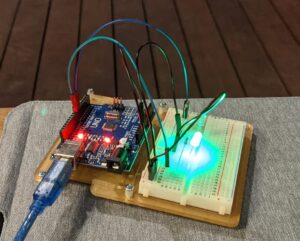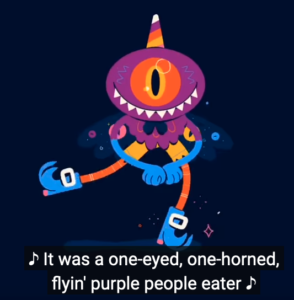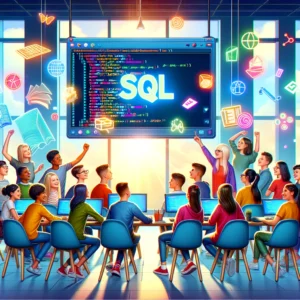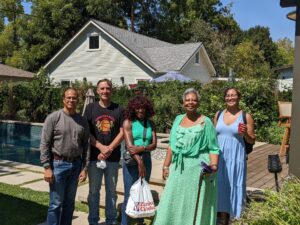SQL and Partners – April 2024
Our first Intermediate course was on SQL/databases.
SQL & Partners – April 2024
Hope IT just finished our first Intermediate course. We want to start creating more Intermediate courses, for students that have taken many of our beginning courses, and to offer them topics that lead directly into paid positions.
SQL (and databases) is one such topic so many programmers know. SQL has been stable for 3 decades unlike other tools and languages that change rapidly over time. Part of the reason is the many companies that have databases that use SQL, and many programmers just pull data out using this technology, and the problem is so well bounded. The flip side is, because so many programmers know SQL, it is one of those languages that new databases need to offer, if it will be widely adopted.
With this new course, we only had one student that was ready for this Intermediate course, so this was an invite-only situation. As this student is far away from LA, we adapted the course to be on-line. It is best to have this course be taught in-person.
Another interesting development occurred: Due to all the Hope IT team members schedules in March, we could not all be at the course. So we took turns leading the course; we all know SQL. This allowed each of the Hope IT team members to explain different topics, and give different emphasis. Overall, this course turned out to be very strong…and advanced…for this one student. We learned how to improve the course for next time. Below are some of the highlights.
- We tried to make it fun, so we used an old 1950’s novelty song: “One Eye, One Horn Flying Purple People Eater”. (See picture above). Look it up for the video. The idea is, if there are dangerous alien one-eye creatures, how about 2 eye creatures? 3-eyed creatures? You get the idea…one needs a database to keep track of all the creatures.
- We used SQL to pull the data of these creatures from the database. We used an on-line database emulator called DB-Fiddle. We also have all our slides and sample code in our Git Lab (commercial public code repository) site, for the student to review as he wishes. (The picture below shows you a visual example of what SQL does, pulling data out of the creatures table.)
- We showed how to add (insert) more creatures, delete creatures, and change (update) creatures. We also used dates to track when creatures were found. Dates are a key part of SQL and databases; students need to understand how time is represented.
- We got into very advanced topics like:
- Indexes: How to structure data for very fast retrieval.
- Transactions: How to ensure a whole group of changes are done at one time.
- Very Large databases: We just reviewed what professionals need to think about when your database is very, very large.
To touch this off, in the same theme of showing differences, our Scriptural reflections was the parable of the sower, and the 4 different places the seeds were sown. And we reflect how we can be good soil.
Partners
Hope IT would not be able to function without partners. No kids, no laptops, no Rotobic kits, no internships, no funds for kids that are assistants and co-instructors, no fun, no Hope IT. Our partners make it happen. So we appreciate all our partners. We created a new web page, see the link below.
Here we want to highlight, and thank our partners:
- Knox Presbyterian Church has been with us since day 1. We are in year 8 now. Knox has supported us with prayers, encouragement, financial support, offer their rooms for our courses, allowing us to use their background checks, the same they do with all the adults that work with the Knox children at Sunday School.
- BridgesUS is Hope IT’s fiscal sponsor, and provides us monthly coaching. Bridges has been a key partner to offer the internships to kids, working on the Bridges website, using WordPress. Lastly, Bridges handles the work permits and checks to kids that go through our internship, or are paid being assistants or co-instructors in the Hope IT courses.
- Barnabas Robotics offers us encouragement, and are our friends. We buy our Robotic kits from them, as they are packaged nicely and well-thought out.
- Door of Hope has been a key partner over many years, but especially these last 2 years. Most of the students coming to the Hope IT courses after COVID have been from the Door of Hope.
- Sycamores (Foster Care Group Home) in Altadena has sent some of their boys over many years now to Hope IT courses. We continually work together to find ways to get their boys enrichment opportunities at the Hope IT courses.
- Stars (after-school and mentorship program) has been a partner for years with Hope IT. Our highlights are having 3 Stars-only courses. 2 were WordPress during COIVD; these were on-line courses. A more recent course was creating games with Roblox, with 4th and 5th graders; that was our largest course ever, with 9 students.
Meeting with Stars
Hope IT just had a good re-introduction with Stars a few weeks ago. As mentioned above, Stars is an after-school and mentoring program for underserved kids in the Pasadena area. Three members of the Hope IT team came. Hope IT visited their new facilities at Lake Avenue Church. We heard about many of their efforts during COVID, caring for kids and families around Pasadena. We are touched and just in awe of their work. We spoke to key members of the Stars team, and showed what Hope IT has done since 2023. We agreed to find ways to partner. We look forward to working with them going forward. (We forgot to take a picture to show you all.)
Hope IT has a little break in April and May, before we finish this school year with another course in June, Solving Mazes with Python. We’ll probably have a few more newsletters before the school ends.
We are so grateful for all your prayers, support, and encouragement. We think kids do see their skill and confidence improve, and see their futures more positively. Thank God.
Peace,–Mike Veerman
Hope IT team lead
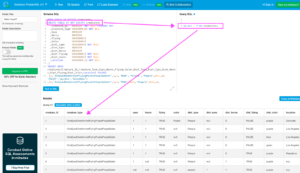
Week 1 in our SQL course – SELECTing all rows from the Creatures table
3 courses in 3 months – March 2024
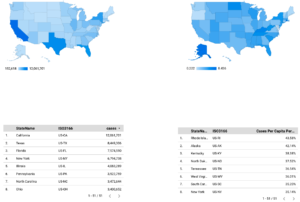
3 courses in 3 months – March 2024
Happy (very) belated new year. Hope IT has been very busy. Our new year has started with a full slate of courses; we finished 2 courses already, and one new course is coming up.
Data Analysis course in January:
We had 2 students attend our Data Analysis course in January, the third time we taught it. Below are the highlights of this course.
- Both students were from the Door of Hope. Ages are 13 and 17.
- Great to see students learn about data analysis, which is used in many companies, and very marketable.
- This was an on-line course, to avoid the spread of COVID. This also allows students that are far away to join in.
- Recruiting for a course early in the year is difficult, as our partners are also just regrouping after the holidays. We were pleased with the turn out.
- The course covers how to make sense of data, and how to present this data, in grids or charts. The above US chart was created by our student in the course, showing the states in different shades of blue. The darkest shade is the highest value.
- On the chart on the left, we show which states had the most cases of COVID.
- But after thinking about this a bit more, we notice something: Just because a state has a larger population, that should not mean they did poorly in preventing the spread of COVID.
- So the chart on the right shows percent of cases by the state population. This changes our understanding: Now which states had more COVID cases per their population?
- The other main dataset we reviewed was Video Game sales, globally. We had fun finding which games sold more, and in which region of the world.
- We also saw that just selling more games does not mean you make more money: that also depends on price.
- We also saw that if a game was just introduced, less were sold due to lack of time.
WordPress in February:
WordPress helps to make websites quickly and easily. It is a great skill to have. We had two students come to this course.
- The students are 10 and 13 years of age, both from the Door of Hope.
- We had 6 students sign up for this course, but only 2 showed up. We need to keep working on sign ups, and getting students to the course.
- One of our older Hope IT students co-taught this course:
- This is the same student that took this course for the first time last year, and went through the Hope IT internship, using his gained WordPresss skills.
- He got paid to co-teach this course.
- We want all of our students to grow, including giving them teaching skills. It is not easy in an on-line situation, given the broad age range in the class. Still, he kept track of each student’s progress and helped them as needed. We saw his teaching skills progress even more over time.
- We are touched by the topics the students pick for their websites.See the two pictures below of some of their web pages.
- One was a help resource to select Health Insurance.
- The other was how to have kids learn to play video games
- The students learned how to change web pages
- They changed existing web pages, and added newly created web pages to the website menu.
- The students added links, videos, pictures, and even created a blog.
- The students learned about plugins, which enhance the features of your websites.
- The best plugin we use is Elementor, the web page builder, that makes changes just by clicking and dragging.
- The WP Power Stat plugin allows one to see the traffic of those coming to our website, and which pages they go to.
- Another plugin example is how to control what is shown after a Google search, describing your web page, called Yoast SEO.
- We introduced other plugins, like duplicating a webpage, and we talk about security plugins, keeping your logins safe…no strangers allowed into your website administration dashboard.
Intermediate SQL/database course in March:
Hope IT continues to have another back-to-back-to-back course. This next one is very, very special. Our new SQL/database course at a higher level…our very first Intermediate course. All other courses are beginner’s courses, just to get a taste of the topic. This next SQL/database course offers direct skills a programmer needs to get data our of a database.
This course Hope IT determined is an invite-only course. We have one student coming (from the Door of Hope.) He is a Senior in high school, and very ready for real-industry skills. He takes our Hope IT courses very seriously. We look forward to this new course to start, and will give you an update. This course will be an on-line course, as this one student lives far away from Pasadena. We’ll give you an update on how it went.
What a start of the new year! At the end of our SQL/database course, we would have 12 straight Saturdays of courses, 3 courses in a row. That’s a record. Our team is strong enough that someone takes breaks, others on the team continue the course. We enjoy working as a team. The bad part of all these on-line courses, we don’t really have photos to share with you.
God bless.
Peace,
–Mike Veerman
Hope IT team lead


PartnersLuncheon_RoboticsCourse-Nov2023
Partner’s luncheon / Robotics course – Nov. 2023
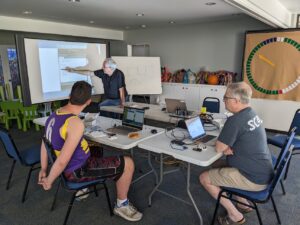
Hope IT is grateful to share with you how our Partner’s Luncheon went in September, and our Robotics course in October. We are also active in preparing for 3 courses coming up in January, February, and March.
Partner’s Luncheon in September:
Hope IT hosted a luncheon for our partners. This is an excellent opportunity for the Hope IT team to connect with leaders, when we are not laser focused on students. This gathering is one way for Hope IT to thank the leaders at our partner organizations for both what they do week in and week out for their youth, and for connecting with Hope IT. We were so engaged, we did not get a picture. Below is a summary of our time.
- 8 folks were at the luncheon.
- 4 members of the Hope IT team
- 2 members of the 2 partners below.
- We got to reflect on the impact of students from last school year. These stories were told by the partners themselves. These stories highlight how each organization and Hope IT are making an impact on a few students, which motivates us all to continue.
- We reviewed the Hope IT courses planned for this school year. Hope IT got to explain how each of these courses connect to learning, increasing confidence for students in the tech field, and how these course connect to real IT jobs. We got to give brief demos of the content of each course.
- We met at Knox Presbyterian Church, where our in-person courses are held. This gives our partners a solid idea of the environment their students will be coming to…a safe, spacious, quiet, and welcoming space. (We are thankful to our partners at Knox Presbyterian Church!!)
- We had some time to answer questions. One key question was, with all the IT layoffs, are IT jobs still worth pursuing. The Hope IT team gave a responding answer of “Yes”, as IT skills cross over in so many areas, and having IT skills are very marketable. All jobs are changing, and you can adapt better with IT skills.
Robotics course completed:
We had 3 students come to the Robotics course. We always have fun with this course, and it is a great way to connect with new students, and have them work on something new. Here are some key highlights.
- These 3 students came from 2 organizations:
- Sycamores: It has been a few years since Hope IT had a student from Sycamores, the foster group home for boys in Altadena. We are so grateful to have students from Sycamore again.
- Thrive Learning Lab of NW Pasadena: This is a new partner for Hope IT !! We had 2 students from this group. This partner is an after-school program, and also faith-based. We look forward to continued students from Thrive Learning Lab!
- These students are at the perfect age to be old enough to handle complex IT topics, and young enough to have time to learn. They are all freshmen and sophmores in high school.
- It is always precious to meet new students, and hear what they are going through, and see what makes them intrigued, engaged, and yes, bored. We hear a little of what is going on in their lives..like why one student is on crutches…falling off his scooter…and that he may have surgery.
- The challenging aspect of this Robotic course was, as the pictures above shows, the students were not at the sessions at the same time. Some missed one of the 4 sessions. Some had to leave early; others came late. Our team had to juggle and customize the lessons, to get students caught up and re-teach what other students already covered. No dull moments at a Hope IT course!!
- On the last Saturday of the course, 2 of the 3 regular team members could not make it. Our Hope IT team…and our extended friends…is large enough to continue the course…by filling in…opening the doors…handing over the equipment for the course…and finishing in strong fashion. What a team!!
Upcoming courses:
Normally, the Hope IT team would have a break at this time of the year. This school year, we are planning for more courses. So we are busy meeting to prepare lesson plans, and cover with some of us cannot be there. Here is what is coming up:
- January: Data Analysis course: Working with data is a red, red hot hot skill in IT…emphasis intended!! This is a great way to learn about pulling in data into dashboards, and how to present the data accurately in grids and charts that others can quickly grasp what is going on. This is an on-line course, so students anywhere can join in.
- February – WordPress course: This course shows how to create and maintain websites, using WordPress. As COVID was so long, this course is the most taught course that Hope IT has, so this is a tried and true course for us. On the end of this course, Hope IT with our partners at Bridges, offer a paid internship for one student that take this course. We are thrilled that the internship last school year worked out so well for one student.
- March – SQL/Database course: This is our first Intermediate course. This topic is not taught in high school. Knowing databases and the SQL language is a direct skill that IT programmers use. I have used SQL for 25+ years. This course will allow students to begin to have job-ready skills.
Monthly “Check-in” times:
Lastly, Hope IT remains connected to our students from last year. There are 2 key students that attended almost all of our courses last year. However, they moved far away from the LA area over the summer. They are in new schools now. They are seniors in high school this year. Hope IT is creating monthly “check-in” times for us to stay connected, offer encouragement, and keep the relationship going…growing. Hope IT team is experimenting with these times, to have the students join all at the same time, and probably encourage each other. We are touched by these times, and our students are so appreciative of staying connected. Below is what we chatted about in our last gathering this month:
- We talked about IT/programming courses they are taking in high school or community college, as well as their art classes.
- The conversation came to discuss why a debate course could really help one learn how to defend one’s ideas.
- We also touch quickly on their college admission work….key time for that!
We know God is looking for faithfulness. Hope IT is not a resounding, shining example of success. We keep at it. Thank you for your support, and prayers.
Have a great Thanksgiving, and Spirit-filled Christmas.
Gratefully,
–Mike Veerman
Hope IT team lead
Start of a New School Year – September 2023
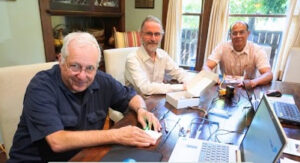
Hope IT is preparing for a new school year. We have new goals and ideas. Please pray for the students that will come this year to our courses, for their parents and families, for the Hope IT partnering organizations, and for the Hope IT team. We have seen how time, energy and experiences can reshape how our young students see themselves, God, and their future.
Goals for the 2023-24 School Year:
Hope IT is working on improvements from last year:
-
- Strengthen our partnerships: Continue to expand and deepen our relationship with our partners.
- Intermediate courses: Offer new set of courses with more IT industry-wide technology and techniques.
- Students be the teachers: One of Hope IT’s dreams is to guide students to have enough skill and confidence, that they can teach and/or co-teach our basic courses.
- Extra Class: Offer other opportunities beyond our courses, such as field trips to JPL for students, or other such events.
You will see some of these goals show up in our efforts.
Deepening work with partners:
The key to the effort of Hope IT is deepening our effort with our partners. Hope IT is part of the holistic care of the student. Once there is trust and common understanding of what Hope IT aims to do, and why that is compelling for young students, partnership is working better. Hope IT can offer extended opportunities for students, but Hope IT does not have the resources or experience to guide and care for many of the core needs of the students.
This is where partnership is so key. Hope IT saw some good partnership begin to foster last year, and we look to both expand to new partners, and go further with existing ones. Below are a few examples of both:
-
- We will have another Partner’s Luncheon in September, to explain the goals and courses Hope IT will offer this year.
-
- We have an advantage this year, now that some of our partners can share stories of both success and challenges their students encountered in dealing with Hope IT courses, and opportunities.
- We could have a full room-full of partners, as 8 partner organizations could join us. Last year, we have 4 partner organizations join us for the luncheon.
- We can now ask better questions of what is working, and what is not. One small change we made is start our courses a bit latter, at 10am, instead of 9:30am. We can also look back at previous courses, and even our paid internship.
- The partners that are invited (in alpha order): Door of Hope
-
- Elizabeth House
- Harambee
- Iglesia de la Communidad (in Highland Park)
- Pasadena Church
- Stars
- Sycamores Foster Group Home
- Thrive Learning Lab NW Pasadena
-
- We were planning a Robotics course in September with Elizabeth House, in their new Mother and Child Well-Being Center, which they relaunched this August (see the above picture of our team at the relaunch event). Elizabeth House is a new partner Hope IT is trying to work with. Unfortunately, we had to cancel this course, as we did not receive enough sign ups.
- Hope IT looks to help guide a senior in high school to what is possible at the college level.
- Hope IT cannot function without the long-standing partnership from Knox Presbyterian Church, where our October and June courses are held, and where 94% of our funding for our laptops, Robotics kits, paid internship, and partnership luncheon comes from.
- Hope IT also cannot be successful without the key partnership of Bridges, who provides our fiscal sponsorship (so tax deductible donations can be received), fiscal help to pay our interns via their work permit, offering the internship, and key monthly coaching.
Finally, our support from you individually, from prayers, kind words of encouagement, and gifts in kind (4 laptops to date!!) are so key to allow Hope IT to continue.
-
- We will have another Partner’s Luncheon in September, to explain the goals and courses Hope IT will offer this year.
Hope IT is so grateful for the partnership we have had, and continue to have. We look forward to another good year.
Courses offered:
Hope IT is offering the same courses offered last school year. We seem to have a rhythm with the 3 basic courses of Robotics, WordPress, and Solving Mazes with the Python programming language.
We are adding a new approach. To date, we have only offered beginning courses. Now, we will offer an intermediate course, on SQL (which is how programmers pull data out of a database.) To prepare students for this, we are offering a 4th beginning course in January, on Data Analysis.
We have a full load of courses. It will be a stretch for Hope IT to pull this off. The schedule of courses is below.
| Month | Description |
|---|---|
| October | Introduction to Robotics: Get hands on with the wiring, circuits, and components to make a robot. |
| January | Data Analysis (online): Create dashboards to present data with grids, line and bar charts, and filters. |
| February | WordPress (online): Create a website with no programming. Add pictures, videos, links, and a blog. |
| March | New Intermediate course on SQL & Databases: Learn this super important skill to pull data out of a database. |
| June | Solve Mazes with Python programming: Python is one of the most widely used programming languages for so many uses. Learn some of the basics, while having fun making a virtual robot get out of a maze. |
We know, some of our efforts will work, and some may not pan out like we hope. We will keep working at it, trying to give students opportunities and allow them fun, expanded community with adults and IT professionals, and real IT skills.
We look forward to what God has in store for us this school year. Do continue to pray for us, our students, partners, and team.
2022-23 – A School Year of Increase – August 2023
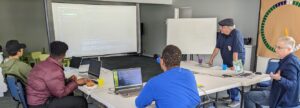
Hope IT is thankful to God, our students, our partners, and for your supportive prayers and gifts. In this update, we highlight the June course, and review how the last 2022-23 school-year went.
June course:
In June, Hope IT had a Maze Solving course using the Python programming language. See more details about the course at this link. Below are the highlights of this course in June:
- 3 students from the Door of Hope started the course, and 1 student finished. These 3 young men were 17 to 20 years old.
- All 3 were returning students from other courses this year. 2 of them took 3 courses this year with Hope IT; these 2 students are moving out of the Los Angeles area, so we had to say good-bye to them.
- Each week we used better approaches to solve the maze, from randomly moving around, to not repeating steps just taken (going back and forth aimlessly), to using the right-hand rule to solve mazes (which almost works well.) The screenshot below shows a sample of the virtual robot in the maze.
This is the second time Hope IT taught this course. The last time we taught this was back in February 2020 (before COVID). - We covered many situations where we developed and altered code, making and fixing mistakes and learning to be a programmer solving a problem with some complexity. We showed why grit is necessary for programming.
- Both pictures above and below are from this course.
End of the 2022-23 School Year in Review:
-
Partnership luncheon:
- Looking back at our partner lunch in September 2022 we re-newed our connections with long-standing partners, and even new ones.
- The staff at our partners continues to change, so connecting with them in-person last Fall was so key.
- Those connections built successful courses, with students gaining skills and opportunities.
-
Students:
- We had a total 21 students attend out 5 courses. As a comparison, the previous school year we had 4 students in 3 courses.
- As we mentioned above, 2 of our most consistent students (older, 16 year olds) are moving out of the Los Angeles area, so we will only have limited connection with them via on-line courses; this coming school year will be their senior year of high school. This also means, we need to bring in a whole new set of students this next upcoming school year.
-
Courses:
- We had 5 courses this year, more than our usual 3 courses per year.
- We had in-person courses again (4 of the 5 were in-person), which brought out our energy out more as we taught and led the courses.
- 2 courses were dedicated to just our partners students, at Stars and the Door of Hope.
- We had a brand new Robotics course, and we taught it twice this school year. It was a big success, gaining the excitement of kids and partners.
- Our Roblox course had 9 energetic 4th and 5th graders, the most students we ever had in a course. It was a learning curve for our team, for sure.
-
Internship was a success:
- One of our students successfully completed the paid internship. He is a 17 year old high school junior. We are very proud of him.
- This not only gets this student very far in opening new opportunities, but the Hope IT team gained experience, to prepare and guide other students through internships.
- This internship was with our partner, Bridges, working on the Bridges website. We are so thankful to Bridges.
- The internship was 20 paid hours of remote work, to create a better format on a web page, to present all their Bridge leaders. The student had to show a few prototypes, for Bridges to decide which to use.
- The Hope IT student used his acquired WordPress skills from the October Hope IT course, to work on the Bridges website. These skills are need to expand and adapt, as Bridges uses the Divi framework rather than the Elementor framework used in the Hope IT WordPress course. (Both are very popular in the industry.)
- Soft skills the student gained includes how to be ready and on-time for on-line meetings, and making presentations to the boss, and how to interact with people at work. We got very positive feedback about him.
-
More funding, more equipment:
- Hope IT received 60% more funding this school year, from our usual $1,000 to $1,600 this year.
- With the extra funding, Hope IT purchased 2 more laptops, so we now have a base of 5 laptops for our courses, permitting us to have more students.
- This summer, a couple also gifted Hope IT 2 older laptops, so we expanded further, from 5 laptops to 7 laptops.
- The extra funding allowed us to have a paid internship!!
- The funding also allows Hope IT to have Robotics kits ($30 each), so that we give kits to the students at the end of the course; great to see the student’s faces when they realize they get their own kit to use after class.
-
Hope IT team changes
- 2 long-term team members had to leave our team. They had been with us for 5 years each.
- Hope IT gained 2 new team members; we are grateful.
- We had 2 high-school volunteers to assist us with our April Robotics course. It gives our students even more attention, to ensure everyone is staying on track, and can ask questions. These young volunteers also serve as role models.
You can see God has blessed our students, our Hope IT team, and our efforts this last school year. Thank you for your prayers, support and encouragement.
Working with underserved students is a privilege, a blessing, and challenging. Admittedly, we at times are challenged, and the going gets tough. We look to God for direction and hope, and point to some successes as making all the effort worth it.
We are looking forward to similar increases this upcoming school year, God willing.
Gratefully,
–Mike Veerman
Hope IT team lead
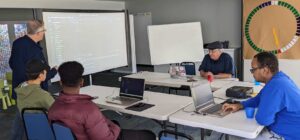

Expanding – March 2023
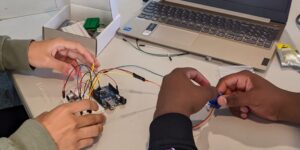
Hope IT is grateful to God for new opportunities. We are really expanding: here are a few highlights. With this expansion, we are now in need of financial support. This is the first time we are asking for financial assistance to support this expansion.
Hope IT is grateful to have 2 courses completed last month, and one course starting in April:
-
- 2 students from the Door of Hope finished the WordPress course, creating web sites.
- They learned how to add pictures, links, videos, and create a blog.
- They also learned about PlugIns, the key idea to WordPress. This allows you to quickly add features to track who visits your website, quickly build web pages, optimize your website appearing in Google searches, and much more.
- 2 students from the Door of Hope finished the WordPress course, creating web sites.
-
- Hope IT finished the Roblox courses with 4th and 5th graders at Stars.
- This was a 6 week course, meeting on Thursday afternoon.
- The kids learned how games they love are created on the platform. The kids also created a small game (created a script), and then program – creating a script – where a player runs an obstacle course with dangerous obstacles. This included changes in lighting over the course of the day.
- The Hope IT was stretched as well, as this was one of the few times the students outnumbered the Hope IT team during a course. These were also the youngest students we taught programming to.
- One student published his game to his Roblox account, and play the game on his phone. It was a small triumph, especially given the impact it had on the other kids watching. We are considering adding this to future classes.
- Hope IT finished the Roblox courses with 4th and 5th graders at Stars.
-
- Hope IT partnering with the Door of Hope for an upcoming Robotic course
- We are hoping 6 students, from ages 13 and up will join in.
- This course will be in April, on 4 Saturday mornings.
- Our 2 students from the October course will assist…and get paid doing so.
- The Hope IT team is growing, and we may have new Hope IT team members join in…including possibly 2 high school students.
- Hope IT partnering with the Door of Hope for an upcoming Robotic course
Hope IT’s efforts are expanding…with expanding costs:
-
- We are expanding our courses offered. We usually offer 3 courses per year. This year, we may have 5.
- We have more students in our courses. This means we need more laptops and mice.
- If our plans go well, we will have 2 Robotics courses this year. We are gladly giving the Robotic kits away to the students after the course. With the Robotic kits cost $30 each, you can see this can begin to add up.
- We are beginning to reward students that have gained skill, in paying them to help assist in our courses.
- We look eagerly towards our paid internship for one student coming up in April with Bridges. This is a 4 week internship, at $16 per hour, for 5 hours per week. The total is $400. Through Bridges, we are paying this student via a work permit. This one student will fill out an internship application, go through a Hope IT interview, and meet with the Hope IT team weekly, to make sure challenges at the workplace do not overwhelm the student.
Hope IT is looking to gain more funding. Please consider donating money.
-
- We have an ambitious plan for the rest of this school year, as well as next school year with more plans of expansion (stay tuned).
- As you know and as listed above, there are costs involved.
- We are buying laptops, Robotic kits, and paying our older kids in the internship program, and assisting in courses.
- We need to raise $1,000 more than our current budget has.
- If you like to donate to Hope IT to help us accomplish all these efforts, continue reading below. We show the steps to donate from our website.
- Your assistance will directly allow kids to gain computer/IT skills, either to acquire more equipment (laptops and Robotic kits), or to pay key students themselves, as they assist in courses and the internship.
We love to see this growth. It brings a different kind of challenge. Bless you for your prayers, and considering financially supporting Hope IT.
What we are firm about is the love of God, and God’s emphasis on caring for those on the margins. Hope IT is so blessed to work with our partners, and especially, with the students that come to Hope IT courses.
God bless.
Gratefully,
–Mike Veerman
Hope IT team lead
Here’s how to donate from the Hope IT website:
Go to our “Donate” web page at this link: https://hopeit.net/donate/
Click the “Donate” button, see the green arrow below.
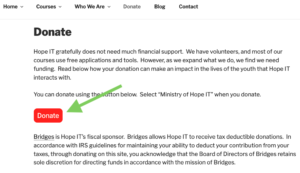
You will be forwarded to the Bridges’ DonorPerfect donation web page. Bridges is Hope IT’s fiscal sponsor. You can give a one-time gift, or set up monthly giving.
-
- Click the default amount, or use the “Other” button to enter an amount you prefer.
- The key point is to select “Ministry of Hope IT” in the Choose Ministry drop down, see the 2nd green arrow below.
- Click the “Next” button.
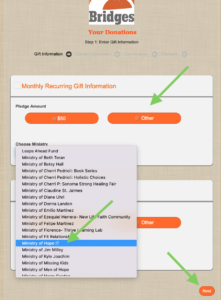
Fill in your personal information (see below), and click the “Next” button at the bottom.

You can donate using your credit card or directly from your bank account. We show both options below, using the “Payment Option” drop down, see the green arrows below. You can also select to cover the small transaction fee, or now. When you are finished, click the “Submit Payment” button at the bottom.


You will receive an email from Bridges, thanking you for your donation. Please keep this donation email for you tax purposes. Hope IT thanks you for your donation!! Thank you for your partnership in allowing underserved students gain computer/IT skill, confidence, and glimpse of God’s love.
New Year – New efforts
Hope IT – New Year, New efforts
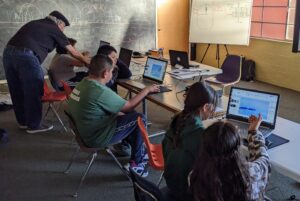
Happy New Year!! Hope IT has welcomed the new year, starting quickly and has many plans for the rest of this school year. Also, this is the 7th year for Hope IT. We thank God.
Hope IT has started a 6 week Roblox game creation course with 10 students at Star’s after-school program. Here are the highlights:
- 4th and 5th grades on Thursday afternoons are learning how to create games in Roblox (see the picture above).
- Students are learning the key concepts of Building and Scripting in Roblox Studio (see a screen shot below of the tool the students are using.)
- Roblox uses the Lua programming language, which is somewhat like Python. This introduces students to computer aided design and script language programming to automate the game objects.
- There is so much excitement, that the 2nd and 3rd graders are wondering when their turn will be. (We are still evaluating what is the youngest reasonable age for a class.)
- Truth be told: it requires effort, and stretching oneself to take in the new concepts and skills. It can also be frustrating. This is especially so because of the school time lost because of the covid epidemic. Students are much less accustomed to classroom behavior.
- This is the most students Hope IT has ever had in a course.
- Even us instructors are challenged to keep the 10 students moving forward, and remain encouraged and positive. We are learning a lot as well, especially in the proper framing of the material. We are also learning about classroom discipline, with the help from Stars staff, who have had training in teaching, child development, and counseling.
- Roblox is a great transitional play and work space to allow young kids to use their current enjoyment and knowledge (playing games), and learn computer aided design (CAD) and programming concepts that can help them in the future.
Coming up quickly, Hope IT will start our WordPress website creation course in February. Here are the key points.
- WordPress is a good skill to learn, as more than 30% of all websites use WordPress. There are actual jobs looking for people with WordPress experience.
- WordPress does not require programming. Kids can definitely learn this skill.
- The main concepts in WordPress are Themes and Plugins. There are so many of those, students will learn how to share information (text, pictures and videos), sell products, optimize web pages for Internet searches (SEO), and see the traffic of guests to your website, and more.
- A paid internship for one student follows this course. Hope IT will look to have one of our students apply and interview for this internship. Our partner Bridges is looking for one student to help with their website work in WordPress. This is a skill in demand with a large market.
God is creative, and brings a spirit of newness. We are looking forward to how this new year progresses. God bless.
Gratefully,
–Mike Veerman
Hope IT team lead
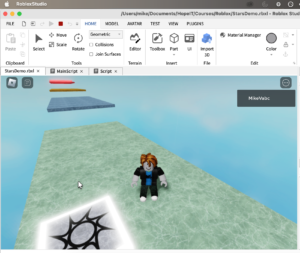
Nov 2022 – Grateful for 2 students & partners
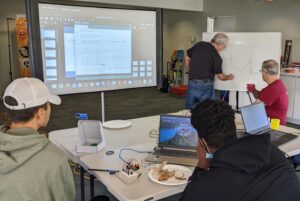
Hope IT is grateful for 2 students and our partners, for successfully completing our Introduction to Robotics course.
After reconnecting with our partners, we had 2 students from the Door of Hope to attend our Robotics course in October. Here are a few highlights:
- Each week, we saw the students learn.
- They wired different circuits.
- That meant doing simple things like lighting up an LED, and then making it blink. This was used to teach the basics of electronic circuits, power, and powered devices.
- Students added a resistor, and understood the difference between 3.3 volts and 5 volts devices and using resistors to integrate devices requiring different voltages.
- The following week, they made a robotic arm move to specified locations at specified times. The arm was controlled by a servo motor. Computer control of physical motion was discussed.
- On the last week, they added an ultrasonic sensor to detect objects 10 centimeters away, and if so, raise the arm…like a parking arm we use all the time to enter a parking lot, and lower it when the car has passed. They did it themselves, and oh, that was fun to see it work. This demonstrated integration of sensors, logic, and mechanical devices using closed loop control.
- And some math involved! We covered angles, speed of sound, and calculating distance. This is a reminder to students to keep up with math, as its so connected to computer skills. The Hope IT team just smiles.
It was intriguing to also visit the Harvest Festival at the Door of Hope before Halloween, and have a table for Hope IT, showing other kids what they can learn. Our 2 students came by the table, and put together the circuits, going through each of the set ups they learned. It was a relaxed, unstructured, fun environment, and an opportunity to reinforce what they learned. One of the students had their mom there watching…and taking pictures. We are all proud of them.
For these students, Hope IT will have a bonus one-day session, in early December, creating ornaments of LED lights, soldering them permanently.
Hope IT is grateful to God for the 2 partners (below) that help Hope IT in the background. We could not serve kids without these 2 key partners. We are thankful for them.
- Knox Presbyterian Church provides us funds – to buy the laptops and the Robotics kits – as well as the great room (see the pictures) to learn and be together.
- Bridges provides Hope IT with coaching to communicate better to partners and supporters, and the fiscal sponsorship to both receive donations, get reimbursed on expenses, and even have an opportunity to pay kids to help teach other kids (via work permit).
Here’s a quick overview of courses coming up.
- Working with Stars, we are tentatively setting up a Roblox course for 4th and 5th graders for January and February.
- In February, Hope IT will have a Saturday morning course on WordPress again. This will be an on-line course, to prevent COVID spread, that usually occurs more in winter.
- We are optimistic for partners with the Door of Hope to have an April Robotics course, and possibly have our 2 students that just took the course, help as assistants. We really look forward to that prospect.
Hope IT is grateful for your support and prayers, our team, our students, and our partners. We see students begin to view their future more positively, and we all see God’s love more. Absolutely why we are doing all this.
God bless, and have a good, spirit-filled Thanksgiving.
Gratefully,
–Mike Veerman
Hope IT team lead
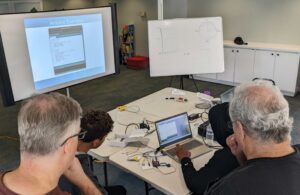
Reset and Robotics – October 2022
For Hope IT, this is time to reset / re-establish our partnerships, and start a new course, Introduction to Robotics!
With COVID lasting these last 2 years, we experienced difficulties connecting with our partners. To improve on that, the Hope IT team had a Zankou lunch (yum) with key leaders in organizations that have partnered with us in the past,as well as new one.
Key takeaways:
- These organizations care and serve underserved kids in the Pasadena area. These organizations are the Door of Hope, Stars, the Elizabeth House, Sycamores (foster group homes for boys), Thrive Learning Lab NW Pasadena, and Pasadena Church.
- We had time to introduce ourselves, review what Hope IT is about, demonstrated a few past courses, and ask how we can partner together.
- We covered why an IT career is compelling for youth, particularly as there are so many good IT jobs in Pasadena.
- Connecting in-person with these leaders was key, as many of them are new to their organizations, and new to Hope IT.
- The above picture is some of the folks that join us. From right to left is Miriam and Karyn from Stars, Florence from Thrive Learning Lab NW Pasadena, and Pastor Brad from Pasadena Church, and me.
We have a brand new course coming this month: Introduction to Robotics. We start this Saturday, October 8th…tomorrow morning!! We will give you an update.
Here’s a quick overview of the Robotics course.
- We use an Arduino kit. We start with a box of wires and components. We thank Barnabas Robotics in Pasadena for the starter kits.
- Slowly, students will be learning about circuits, resistors, and LED lights, and putting them on a breadboard. (I show an example in the picture below.)
- Later, we add programming, moving parts (a servo), and the robot begins to move and react to outside stimulus. (An example is parking arm that senses your car approach, and raising the arm to let you pass.) This takes time to build. Students will learn!
- Key concepts include electrical current flow, sensors, and software control. These are the basic building blocks on how our laptops and smartphone and all devices work. Students will see these directly.
We can see how complex robots are, and how much more complex humans are (read Psalm 139). Such is the art of God. We hope you see God’s blessings around you.
Peace,
–Mike Veerman
Hope IT team lead
